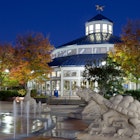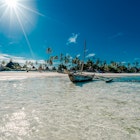
Jasen nature reserve: North Macedoniaтs secret getaway
Feb 10, 2019 тЂ 4 min read

Canyon Matka southwest of Skopje, the capital of North Macedonia. NiglayNik / Shutterstock
Deep in the Balkans, this grandiosely named nature reserve might just be the best-kept secret among Europeтs national parks. Home to the rare Balkan chamois (wild goat) and endangered Eurasian lynx, North Macedoniaтs Jasen is one of the regionтs most ecologically significant areas. While there are no deluxe hotels or ski resorts, outdoors activities range from hiking, mountain biking and kayaking to spelunking, hunting and helicopter skiing.
The тPublic Enterprise for Managing and Protection of the Multipurpose Area Jasenт (better known as just Jasen) sprawls across rugged, mountainous terrain in still little-visited North Macedonia. It became a protected nature reserve in 2010 and has not yet made it onto many tour operatorsт itineraries, despite being only 15km from Skopje, the Macedonian capital.
An unusual history
Comprising some 24,000 hectares of forested mountains, deep caves, lakes and underground rivers, this takes up a large chunk of North Macedoniaтs central mountain massif. The reserve reaches a height of almost 2500m at Mt Karadzica, while the canyon lake at Matka (meaning тwombт in Macedonian) is so deep it is still uncharted, resulting in a nomination to become one of the new Natural Wonders of the World.
Matka, at the parkтs northern tip, is popular with weekenders due to its proximity to the capital, its natural beauty and its hiking opportunities. The Matka area is known for its frescoed Byzantine woodland churches, with some 15 Orthodox Christian churches or monasteries contained within the parksт grounds, dating between the 13th and 15th centuries.
The park also contains more than 30 important historical or archaeological sites, ranging from Stone Age cave art to Hellenistic and late Roman settlements where valuable decorative pieces such as coins, ceramics and statues have been discovered. Of particular note is the 6000-year-old тAdam of Govrlevoт statue, an anatomically precise Neolithic sculpture considered to be one of the oldest and most important discoveries in the world.
Still more eclectic is Jasenтs recent past, which remains cloaked in Cold War ambiguity. In Macedonian popular imagination, this mysterious area т once partly off-limits during communist Yugoslavia т has long been associated with rumours of secret underground military bunkers and tunnels allegedly built by former Yugoslav leader Josip Broz Tito.

A haven for wildlife
Wildlife lovers will be well rewarded in Jasenтs oak, beech and black pine forests, filled with a wide variety of flora and fauna. The mountain rivers are home to freshwater crabs and river trout, while more than 160 bird species, including golden eagles and peregrine falcons, have been spotted overhead. Jasenтs 47 mammal species т almost one-third the total number found in Europe т include wild boar, deer, brown bears, hares, wolves and a unique subspecies of the European Souslik (ground squirrel). Cameras set up around the reserve caught glimpses of 11 Eurasian lynx (up from six in 2009), indicating that the parkтs conservation efforts are also working.
Hunting is highly controlled and limited to specially arranged groups who pay a premium for the chance to bag a deer, wild boar, the rare Balkan chamois or mouflon (wild sheep).

Park activities
Along with recreational fishing, paragliding and kayaking on Lake Kozjak, caving is available through the . While some caverns can be tackled by neophytes, the majority are for serious spelunkers only. The caves can reach depths of 500m, stretch for 1500m and often get flooded by underground rivers.
Jasenтs winding mountain trails and access roads are also perfect for mountain biking, which allows you to explore much more of the parkтs terrain than simply hiking; park managers can advise on the best routes.
Finally, if you are up for some unforgettable skiing on unroped, virgin terrain, a helicopter fitting eight skiers can be rented for тЌ4000 per day. The helicopter drops you at the peak of Mt Karadzica (2470m), where you ski (accompanied by a local guide) down to Kula at 500m, the park entrance. Depending on speed and skill (this course is for experts only), it is possible to make four to six runs a day on innumerable routes.

Make it happen
To visit the park, email or phone the English-speaking park management at least one week in advance; check the parkтs website for details. There is no entrance fee to the park, but a guided day hike costs тЌ20 per person (groups of 8 to 15 people are preferred). This includes a home-cooked lunch made from the parkтs organic produce and local game, as well as transport to and from Skopje. The park management can also help you arrange any activities you wish to undertake.
There is no camping, but accommodation is available in a rustic hunting lodge at Kula for тЌ50 per person, including breakfast. Bookings should be made through the park management.
First published in April 2012
https://shop.lonelyplanet.com/products/eastern-europe-travel-guide-14
Explore related stories









 Destination PracticalitiesThereтs something fun in every season in the Florida Keys
Destination PracticalitiesThereтs something fun in every season in the Florida KeysDec 21, 2024 тЂ 3 min read
